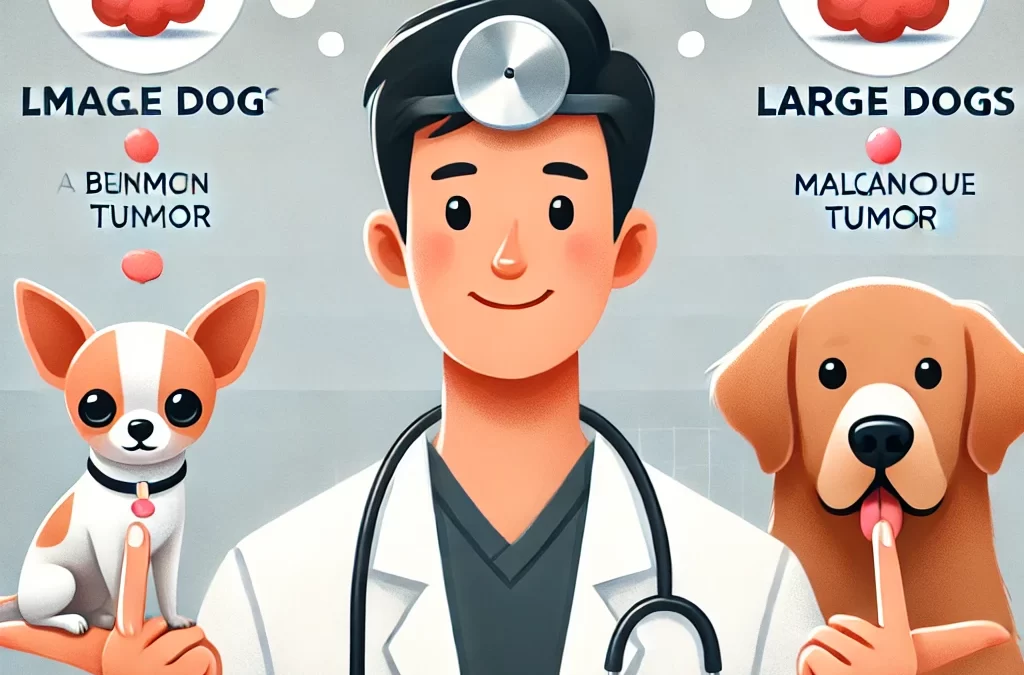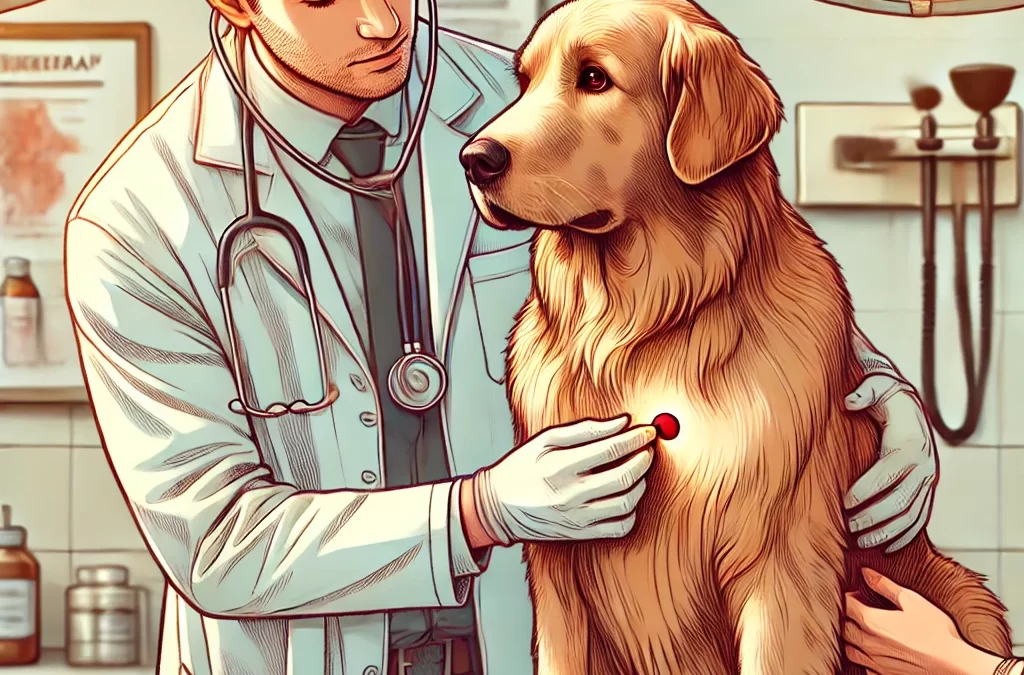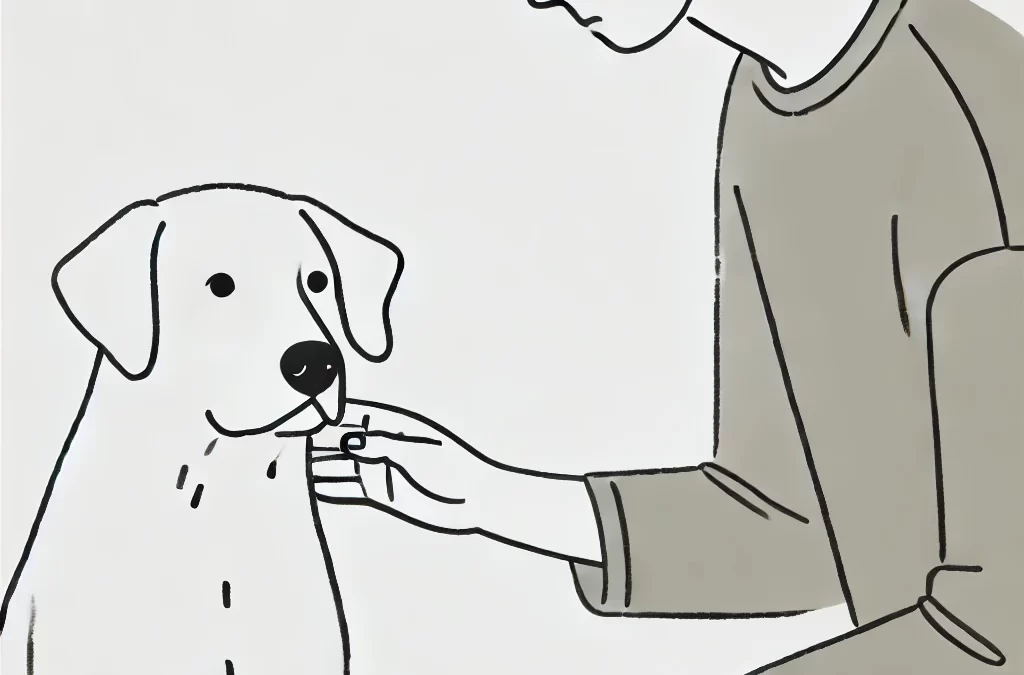
執筆者 TCMVET | 2025年1月21日 | 犬の癌と腫瘍
愛犬が末期がんと闘う姿を見るのは、感情的になり、心が張り裂ける思いです。治癒は不可能かもしれませんが、犬を安心させ、痛みを和らげ、残りの生活の質を向上させる方法はあります。この記事では、末期がんの犬をサポートするための、実用的で思いやりのある、さらには代替的なアプローチについて探ります。
1. 痛みの管理を優先する
痛みの緩和は、末期癌治療の要です。従来の痛み管理の選択肢には、次のようなものがあります。
- 処方鎮痛薬 – NSAID(非ステロイド性抗炎症薬)とオピオイド(トラマドールなど)は、痛みを効果的に管理するのに役立ちます。
- 補助療法 – 神経痛用のガバペンチンと NMDA 拮抗薬のアマンタジンは、他の鎮痛剤と併用すると痛みの緩和につながります。
- CBDオイルとハーブ療法 – 多くのペットの飼い主は、炎症や痛みを自然に軽減するために、フルスペクトル CBD オイル、ターメリック、ボスウェリアを使用しています。
2. 活力を高める栄養補給
がん治療に適した食事は、がんの進行を遅らせ、全体的な健康状態を改善します。次の点を考慮してください。
- 高品質のタンパク質 – 赤身の肉や魚は筋肉の維持に必須のアミノ酸を供給します。
- 健康的な脂肪 – 魚油に含まれるオメガ 3 脂肪酸は炎症を軽減し、腫瘍の成長を遅らせる可能性があります。
- 低炭水化物、高繊維食 – がん細胞は糖分を栄養源として増殖するため、炭水化物の摂取を減らすと進行を遅らせることができる可能性があります。
- 天然サプリメント – カワラヒワや霊芝などの薬用キノコや、黄耆などの漢方薬は免疫力をサポートします。
3. 快適さと可動性のためのホリスティック療法
薬物療法や食事療法に加えて、ホリスティック治療によってさらなる緩和効果が得られます。
- 鍼治療 – 痛みを軽減し、可動性を改善し、エネルギーバランスを刺激します。
- マッサージ療法 – 優しいマッサージは血行を促進し、こわばりを和らげます。
- ハイドロセラピー – 温水療法は関節への圧力を軽減し、穏やかな運動を促進します。
- エネルギーヒーリングとレイキ – ペットの飼い主の中には、リラックスやストレス解消のためにエネルギーヒーリングを試みる人もいます。
4. 快適な環境づくり
犬の生活空間を適応させることで、大きな違いが生まれます。
- ソフト寝具と整形外科用サポート – 低反発フォームベッドは床ずれや関節痛を軽減します。
- 温度制御 – 高齢で病気の犬は体温調節が困難なため、冬は暖かく、夏は涼しく保つことが重要です。
- ストレスを最小限に抑える – 馴染みのある香りのある静かで落ち着いた環境は、不安や痛みを和らげるのに役立ちます。
5. 消化器系の問題と水分補給の管理
がんは吐き気、下痢、食欲不振を引き起こす可能性があります。これらの症状に対処することで健康状態の改善につながります。
- Appetite Stimulants – ミルタザピンなどの薬は、食事を促すことがあります。
- 自家製ボーンブロス – 胃に優しく、栄養がたっぷり、水分補給にもなります。
- プロバイオティクスと消化酵素 – 腸の健康をサポートし、消化を助けます。
- こまめな水分補給 – 十分な水分摂取は脱水症状を防ぎ、腎臓機能をサポートします。
6. 感情的なサポートと絆を深める瞬間
あなたの存在は、最期を迎えた犬にとって最大の慰めの一つです。一緒に時間を過ごしましょう。
- 好きな活動に参加する – 短い散歩、車への乗車、または静かに抱き合うことで喜びがもたらされます。
- 犬に話しかける – あなたの声の響きは安心感と落ち着きを与えてくれます。
- 恐れずに存在しよう – 犬は感情を感知するので、穏やかで愛情のあるエネルギーを維持すると安心感を得られます。
7. 別れを告げるタイミングを知る
最も難しい決断の 1 つは、安楽死が最も思いやりのある選択であるかどうかを判断することです。次の点を考慮してください。
- HHHHHMMスケール – アリス・ビジャロボス博士によって開発されたこの生活の質の評価では、痛み、空腹、水分補給、衛生、幸福、運動能力、悪い日よりも良い日が多いかどうかを測定します。
- 獣医ホスピスと在宅安楽死 – 多くの獣医師は、慣れ親しんだ環境で穏やかな移行ができるよう、在宅サービスを提供しています。
- 犬の声を聞く – 態度の変化、薬を飲んでも痛みが続く、または食欲が完全になくなるなどの症状が現れたら、手術の時期が来た可能性があります。
結論
末期がんを患う犬の世話は、愛情、献身、思いやりに満ちた深い経験です。痛みの管理、栄養補給、ホリスティック療法、精神的健康に重点を置くことで、飼い主は愛犬の残りの日々が安らぎと尊厳に満ちたものとなるよう保証できます。緩和ケアを選択する場合でも、最終的に別れを告げるという難しい決断を下す場合でも、目標は同じです。絆を尊重し、可能な限り最高の生活の質を与えることです。

執筆者 TCMVET | 2025年1月20日 | 犬の癌と腫瘍
犬のがんや腫瘍の発生に関しては、サイズが文字通り重要です。小型犬と大型犬では遺伝的素因、代謝率、免疫反応が異なり、これらはすべて腫瘍の発生、進行、治療への反応の違いに影響します。愛犬の健康を心配している飼い主であれば、これらの違いを理解することで、予防、早期発見、治療について十分な情報に基づいた決定を下すことができます。
1. 遺伝的要因: 品種特有の腫瘍リスク
いくつかの癌は特定の犬種に多く見られ、犬のサイズがこの素因に影響を与える場合がよくあります。
- 大型犬ゴールデンレトリバー、グレートデーン、ロットワイラーなどの犬は発症する可能性が高い 骨肉腫(骨の癌)、血管肉腫(血管の癌)、リンパ腫これらの癌は悪性度が高く、急速に転移する傾向があります。
- 小型犬プードル、ダックスフント、チワワなどの犬種は、 脂肪腫や乳頭腫などの良性腫瘍、しかし、彼らはまた、 乳腺腫瘍および膀胱がん.
違いは腫瘍の種類だけではなく、これらの癌がどのように行動し、治療に反応するかにも表れます。
2. 腫瘍の成長速度と挙動
腫瘍の進行は、成長速度と細胞代謝の違いにより、小型犬と大型犬の間で大きく異なります。
- 大型犬の成長が早い大型犬は子犬の頃に急速に成長し、この急速な細胞分裂が、 悪性腫瘍 高齢になると、腫瘍もより悪性度が増す傾向があります。
- 小型犬の成長は遅い小型犬では腫瘍の進行が遅い場合もありますが、それでも懸念事項です。 良性腫瘍 脂肪腫は一般的ですが、大きくなりすぎると運動障害を引き起こす可能性があります。さらに、小型犬でも悪性腫瘍が発生することがあります。 肥満細胞腫治療せずに放置すると広がる可能性があります。
3. 平均寿命と腫瘍の発症
大型犬は小型犬よりも寿命が短い傾向があり、これが腫瘍の発達のタイムラインに影響を与えます。
- 大型犬の早期発症がん大型犬は老化が早いため、若い年齢でがんを発症する可能性が高く、多くの場合、 6〜8歳つまり、飼い主は早期にがん検診と予防ケアを始めるべきだということです。
- 小型犬の後発性腫瘍小型犬は、成長が遅くなるまで癌の兆候が現れない場合があります。 シニア世代(10歳以上)つまり、長期的な監視が不可欠です。
これらのタイムラインを理解することで、ペットの飼い主は適切なタイミングで獣医の診察をスケジュールし、潜在的な腫瘍を早期に発見できるようになります。
4. 診断と治療の課題
腫瘍の診断と治療においては、腫瘍の大きさが検出と処置の実行能力の両方において重要な役割を果たします。
- 外科手術に関する考慮事項大型犬は体重が大きいため、一部の手術には耐えることができますが、体重を支える骨の腫瘍(骨肉腫など)を除去するのは困難な場合があります。一方、小型犬は、特に非常に小さい場合、麻酔のリスクに苦しむ可能性があります。
- 化学療法と薬物療法の違い: 化学療法の投与量は体重に依存し、大型犬では より高い薬剤投与量治療費が増加します。小型犬は投与量が少ないにもかかわらず、繊細な体質のため副作用が強くなる可能性があります。
5. 予防と早期発見戦略
大きさに関係なく、早期発見が重要です。犬の飼い主ができることは次の通りです。
- 定期的な獣医検査定期的な検査は、腫瘍が大きくなりすぎる前に発見するのに役立ちます。
- 自宅での健康診断: 毎週犬の体に手を動かすと、異常な腫れを見つけるのに役立ちます。
- 犬種別がん検査大型犬種は早期にレントゲン検査と超音波検査を受ける必要がありますが、小型犬種は皮膚と膀胱の検査を受けると良いでしょう。
- 食事とライフスタイルの調整バランスの取れた食事、定期的な運動、体重管理は、全体的な健康をサポートし、がんのリスクを軽減するのに役立ちます。
最終的な考え
腫瘍は小型犬にも大型犬にも発生しますが、遺伝的特徴、腫瘍の挙動、治療オプションが異なるため、飼い主はそれぞれに合わせたケア戦略が必要です。大型犬は若いうちから悪性腫瘍になりやすく、小型犬は成長が遅い腫瘍を発症することがあります。これらの違いを理解し、早期発見を優先することで、飼い主はペットの生活の質を向上させ、一緒に過ごす時間を延ばすことができます。

執筆者 TCMVET | 2025年1月20日 | 犬の癌と腫瘍
想像してみてください。楽しい散歩のあと、愛犬のお腹を撫でてあげたばかりです。突然、指先が今まで気づかなかった小さな突起に触れます。サスペンス音楽が流れます。外来の侵入者 (つまり悪性腫瘍) が巣食っているのでしょうか、それとも愛犬の皮膚の下に潜んでいる無害な寄生虫 (良性腫瘍) なのでしょうか。警鐘を鳴らしたり、無視したりする前に、愛犬の体に潜む謎の新住人を解読する方法を少し明らかにしましょう。
1. 「成長CSI」:重要な法医学的手がかり
自分を危険が伴う犯罪ドラマの探偵だと考えてください。あなたの仕事は、すべての証拠を集めることです。
- 質感と可動性悪性腫瘍は不規則な感触で周囲の組織に付着することが多いのに対し、良性のしこりはより滑らかで動きやすい傾向があります。
- 成長率: その腫れは風船のように急速に膨らんでいますか、それとも数週間または数か月間同じ大きさのままですか? 成長が速い場合は悪性腫瘍の可能性があります。
- 関連症状食欲の変化、無気力、体重減少、または局所的な痛みは、すぐに対処する必要がある追加の危険信号である可能性があります。
重要なポイントは、しこりの感触だけで結論を急がないこと。ただし、観察結果を「探偵ノート」に記録しておいてください。
2. 科学的情報: 診断テストが真実を明らかにする
優れたスリラー小説と同じように、事件を解決するには有能なパートナーが必要です。このエピソードでは、ハイテクなツールと鋭い観察力を備えた信頼できる獣医がパートナーとなります。
- 穿刺吸引法(FNA): 細胞レベルの手がかりを即座に提供できる、迅速で低侵襲性の検査です。腫瘍の正体を示す「指紋」を採取すると考えてください。
- 生検: 容疑者の DNA を分析するなど、より詳細な調査が必要になる場合もあります。生検により、組織の構造と細胞の挙動をより深く調べることができます。
- イメージングツールX 線、超音波、MRI は探偵の拡大鏡として機能し、腫瘍の境界や潜在的な広がりに関する隠れた手がかりを見つけ出します。
3. 腫瘍か良性腫瘍か?判決を理解する
証拠を集めて検査を行えば、判決が下されます。悪性腫瘍(私たちの「外来侵入者」)は、浸潤や転移のリスクを伴います。そのため、手術、化学療法、放射線療法など、迅速で、時には積極的な治療が必要になることがよくあります。良性腫瘍(私たちの「無害な不法占拠者」)は、一般的にゆっくりと成長し、限局したままですが、だからといって常に無視できるわけではありません。一部の良性腫瘍は、重要な臓器を圧迫したり、時間の経過とともに潰瘍になったりすることがあり、除去または定期的な監視が必要になります。
4. 治療マスタープランの作成
診断結果が無害な不法占拠者であろうと、確実なエイリアンの侵略者であろうと、しっかりとした作戦を立てることは不可欠です。
- 外科的除去: 多くの場合、悪い入居者を立ち退かせるなど、最初の防衛線となります。
- 医薬品と治療法腫瘍が悪性の場合、化学療法、標的療法、または免疫療法によって犬に有利な結果をもたらす可能性があります。
- ライフスタイルの調整: 特別な食事から穏やかな運動ルーチンまで、総合的なサポートにより、治療中も愛犬が最高の気分でいられるようになります。
- 継続的な監視: これは、疑わしい塊が再び現れたり、他の場所に現れたりしないようにするための境界パトロールだと考えてください。
5. 勝利を祝い、旅を共有する
新たなしこりが見つかると、愛するペットの人生に恐ろしい展開が訪れるかもしれません。しかし、覚えておいてください。すべてのしこりが悲惨なシナリオというわけではありません。用心深く、積極的なアプローチをとれば、この「異星人対不法占拠者」の謎を、愛犬の人生冒険の中で扱いやすいサブプロットに変えることができます。獣医と最新情報を共有し、小さな勝利(しこりの安定、手術の成功、元気な状態)を祝い、その過程で尻尾を振るたびに感謝しましょう。
結局のところ、語る価値のある探偵物語はすべて希望で終わるからです。そしておそらく、世界最高の相棒であるあなたの犬に、少し余分におやつを与えることになるでしょう。

執筆者 TCMVET | 2025年1月18日 | 犬の癌と腫瘍
犬のがんは手ごわい課題で、効果的な介入ができないほど手遅れに診断されることも少なくありません。生検や画像診断などの従来の診断ツールには限界があり、侵襲的であったり、費用がかかったり、初期段階で腫瘍を検出できなかったりすることがあります。そこで登場するのが腫瘍バイオマーカーです。血液、尿、組織に含まれる分子シグネチャで、犬の腫瘍学に画期的なアプローチを提供します。獣医学の進歩は人間の腫瘍学の進歩と並行しており、早期検出、リアルタイムのモニタリング、および個別化された治療戦略のための信頼性の高い非侵襲性バイオマーカーの開発競争が始まっています。
1. 腫瘍バイオマーカーとは何か?そしてなぜ重要なのか?
腫瘍バイオマーカーは、がんの存在、進行、または治療への反応を示す測定可能な生物学的物質です。これには次のようなものがあります。
- タンパク質と酵素C反応性タンパク質 (CRP) やチミジンキナーゼ 1 (TK1) などの特定のタンパク質のレベルの上昇は、悪性腫瘍を示している可能性があります。
- 循環腫瘍DNA(ctDNA)血流中に見つかった腫瘍由来 DNA の断片は、遺伝子変異と腫瘍負荷に関する洞察を提供します。
- エクソソームとマイクロRNA(miRNA)小さな細胞外小胞と非コードRNAは、がんの検出と予後診断のための有望なツールとして浮上しています。
癌が臨床的に明らかになる前にそれを検出できれば、犬の治療結果と生活の質が大幅に改善される可能性があります。
2. バイオマーカー革命: 概念から臨床応用まで
2.1. 早期発見:究極のゲームチェンジャー
がんの初期段階では症状が現れないことが多く、定期的な検査が困難です。バイオマーカーは、症状が現れるずっと前に悪性腫瘍を特定することで、このギャップを埋めることができます。
- 犬特有のCRPとTK1: レベルの上昇は、リンパ腫、血管肉腫、肥満細胞腫瘍に関連しています。
- 血清マイクロRNA特定の miRNA プロファイルは骨肉腫や乳腺腫瘍と強く相関しており、高リスク症例を検出するための定期的な血液検査への道が開かれています。
2.2. 予後洞察:結果を正確に予測する
すべての腫瘍が同じように機能するわけではありません。バイオマーカーは、獣医師が悪性腫瘍とゆっくりと成長する腫瘍を区別するのに役立ち、カスタマイズされた治療戦略を可能にします。
- Ki-67 と PCNA (増殖マーカー): 発現レベルが高いと、腫瘍の急速な増殖と予後不良を示唆します。
- LDH(乳酸脱水素酵素)LDH 値の上昇は、血管肉腫の転移を示すことが多く、治療の強度を決定します。
2.3. 治療モニタリング: リアルタイムの治療調整
バイオマーカーにより、腫瘍反応を非侵襲的に追跡できるため、獣医師は治療を動的に調整することができます。
- 循環腫瘍DNA(ctDNA): ctDNA レベルをモニタリングすると、犬が化学療法や放射線療法にどの程度反応しているかがわかります。
- エクソソームプロファイリング治療後のエクソソームカーゴ組成の変化は、残存疾患および再発リスクについての手がかりを提供します。
3. 犬の腫瘍学の未来を形作る最先端技術
3.1. 人工知能(AI)とバイオマーカーの出会い
AI を活用した診断ツールは現在、バイオマーカー パターンを分析するようにトレーニングされており、ほぼ瞬時に高精度な評価を提供します。臨床兆候が現れる前に癌のリスクを予測する AI 駆動の血液検査を想像してみてください。
3.2. 液体生検:侵襲的診断の終焉?
ctDNA とエクソソームマーカーを検出する液体生検は、がん診断に革命を起こす準備ができています。従来の生検とは異なり、液体生検は腫瘍の進化のリアルタイムのスナップショットを最小限の侵襲で提供します。
3.3. 犬のためのパーソナライズされた医療
バイオマーカーの研究が進むにつれて、獣医師は近い将来、バイオマーカーに基づいた意思決定が可能になり、犬固有の腫瘍プロファイルに基づいて最適な化学療法、免疫療法、または標的治療を選択できるようになるかもしれません。
4. 課題と倫理的考慮
有望であるにもかかわらず、バイオマーカーに基づく診断には次のような障害があります。
- 標準化の問題: バイオマーカーのレベルは、品種、年齢、併発疾患によって異なる場合があります。
- コストとアクセス性高度なバイオマーカー検査はまだ高価であり、広く利用可能ではありません。
- 偽陽性と偽陰性: バイオマーカー検査はどれも 100% 完璧というわけではなく、信頼性を確保するにはさらなる改良が必要です。
5. 結論:犬の癌治療における新時代の幕開け
腫瘍バイオマーカーはもはや単なる理論上のツールではなく、犬の癌の診断、予後、治療に急速に不可欠なものになりつつあります。この分子革命を受け入れることで、獣医学は癌をより早く検出し、より正確に治療し、かつてない精度で監視できる未来へと歩み始めています。
技術が進歩するにつれ、犬の複数の癌を検査する簡単な血液検査の夢が間もなく現実となり、犬とその飼い主に、より多くの時間とより良い生活の質という貴重な贈り物が与えられることになるだろう。

執筆者 TCMVET | 2025年1月18日 | 犬の癌と腫瘍
獣医腫瘍学の世界は、最先端の技術と先見性のある研究が融合して犬の脳腫瘍へのアプローチを変革する中で、劇的な変化を目の当たりにしています。従来の診断方法と伝統的な治療法が長い間医師を導いてきましたが、イノベーションの新しい時代は、臨床結果を再定義し、これらの複雑な病状に対する理解を深めることを約束しています。以下では、最先端の診断ツール、人工知能、そして定位放射線手術 (SRS) の影響力の高まりが、犬の神経腫瘍学の限界を押し広げている様子を探ります。
- 症状から疑いへ: 進化する診断環境
1.1. 異常を認識する
歴史的に、犬の脳腫瘍の検出は、持続的な頭の傾き、運動失調、行動や食欲の変化などの微妙な神経学的兆候を認識することにかかっていました。これらの危険信号は依然として重要ですが、高度な画像診断とデータ分析により、より微妙な視点が提供されています。高解像度の画像診断と洗練された診断アルゴリズムのおかげで、医師は現在、炎症性疾患、感染症、腫瘍をより正確に区別できるようになりました。
1.2. 先端画像処理の台頭
• 高磁場 MRI: 頭蓋内病変を視覚化するためのゴールド スタンダードとみなされている高磁場 MRI は、軟部組織と病変の境界の詳細な画像を提供します。機能的 MRI (fMRI) や拡散テンソル画像 (DTI) などの最新の MRI シーケンスにより、腫瘍の生物学をより深く調査し、肉眼的異常が現れる前に微細構造の変化を明らかにすることができます。
• 磁気共鳴分光法 (MRS): MRS は、腫瘍内の代謝変化を評価することで分子レベルの洞察を提供します。たとえば、コリンと乳酸のピーク値の上昇は、悪性腫瘍または急速な成長の早期警告サインとして役立ちます。
• AI 支援画像解析: 人工知能を活用した革新的なアルゴリズムにより、腫瘍の成長を驚異的な速度と精度で検出し、定量化することが可能になりました。これらのツールは、臨床データ、画像マーカー、組織病理学的所見を統合して、腫瘍の進行や治療への反応を予測できます。
1.3. 生検とそれ以降
画像技術は大きく進歩しましたが、組織病理学的確認は依然として確定診断の柱となっています。定位生検技術は侵襲性を最小限に抑え、合併症を減らし、回復を早めます。近い将来、血流中の循環腫瘍細胞または腫瘍 DNA を分析する液体生検により、侵襲的処置の必要性がさらに減り、リアルタイムの腫瘍モニタリングと動的な治療調整への道が開かれる可能性があります。
- 飛躍的進歩:定位放射線手術
2.1. 従来の放射線治療の枠を破る
数十年にわたり、外部放射線治療は、手術不能または手術が困難な犬の脳腫瘍を治療するための事実上の治療法でした。特定の症例では効果的でしたが、数週間にわたる複数回のセッションが必要になることが多かったのです。そこで登場したのが、定位放射線手術 (SRS) です。これは、1 回または数回のセッションで腫瘍に集中した放射線量を照射し、周囲の健康な組織へのダメージを最小限に抑える精密技術です。
2.2. SRSの特徴
• ピンポイントの精度: 高度な画像診断とコンピューターによる治療計画により、放射線ビームが腫瘍のみをターゲットにし、周囲の組織に影響を与えないようにします。
• 治療回数の削減: 多くの犬の SRS プロトコルでは、必要な通院回数が少なくなるため、ペットと飼い主の両方のストレスが軽減されます。
• 迅速な症状緩和: 高線量放射線は腫瘍をより速く縮小させることが多いため、従来の分割放射線療法に比べて症状をより早く抑えることができます。
• 副作用が最小限: 集中的なアプローチにより、皮膚の炎症や脱毛などの放射線関連の合併症が少なくなります。
2.3. 最先端の設備
動物病院では、ガンマナイフやサイバーナイフなどの、かつては人間の医療にのみ使用されていたシステムを採用するケースが増えています。これらの装置は、数百本の収束放射線ビームや、複数の角度から高線量の放射線を照射できるロボットアームを使用しており、比類のない精度と制御性を実現しています。
2.4. SRSと他のモダリティの統合
定位放射線手術はもはや単独の処置ではありません。多くの専門家は、以下のものを組み合わせたマルチモーダルアプローチを提唱しています。
• 顕微鏡的疾患および遠隔転移に対処するための化学療法または標的療法。
• がん細胞を検出し破壊する身体本来の能力を高める免疫療法。
• 全体的な健康状態を改善し、回復を早め、筋肉量を維持するための栄養サポートとリハビリテーション。
- 今後の課題と機会
3.1. 財務および物流上の考慮事項
特殊な放射線治療機器などのハイエンド技術には、多額の費用がかかります。そのため、すべての獣医センターが SRS を提供できるわけではなく、アクセスが制限されます。ただし、技術が成熟し、より多くのクリニックが高度な機器を導入するにつれて、コストは下がる可能性があります。
3.2. 研究の限界を押し広げる
獣医学では、長期的な結果データや大規模な臨床試験が比較的不足しています。獣医師、腫瘍専門医、放射線科医、医療物理学者の間で学際的な連携を育むことで、この分野では犬の SRS の安全性、有効性、最適なプロトコルに関する強力な証拠を集めることができます。
3.3. 個別化医療とその先
分子プロファイリング、遺伝子検査、デジタル健康記録が融合し、獣医医療においてよりパーソナライズされた医療環境が生まれています。将来のイノベーションでは、リアルタイムのバイオマーカー追跡が組み込まれ、治療戦略を即座に適応させることが可能になり、今日ではほとんど想像もできない方法で犬の神経腫瘍学に革命を起こす可能性があります。
- 結論
犬の脳腫瘍の診断と治療は、かつてないほど洗練され、希望に満ちています。高精度の画像診断、AI による分析、定位放射線手術の融合により、獣医腫瘍学の可能性が再定義されています。広範囲なアクセスの確保から大規模な証拠の収集まで、大きな課題は残っていますが、全体的な勢いは、脳腫瘍を患う犬の患者にとってより明るい未来を示しています。
これらの新しい領域に取り組むことで、私たちは犬の神経腫瘍学における治療水準を高めるだけでなく、獣医学自体のより広範な使命、つまり愛するペットの健康、快適さ、寿命を最大限に高めることも高めています。SRS やその他の画期的な治療法が普及するにつれ、かつては遠い可能性に思えたものが急速に新しい標準になりつつあり、脳腫瘍を患う犬に本当に素晴らしい人生の第 2 のチャンスを与えています。

執筆者 TCMVET | 2025年1月17日 | 犬の癌と腫瘍
愛犬に腫瘍があることがわかったら、とてもつらいでしょう。飼い主が最初に尋ねる質問の 1 つは、「愛犬の命はあとどれくらいあるの?」です。答えは、腫瘍の種類、場所、段階、治療の選択肢、愛犬の全般的な健康状態など、さまざまな要因によって異なります。これらの要素を理解することで、情報に基づいた決定を下し、愛犬に最善のケアを提供できるようになります。
腫瘍の種類と寿命への影響
すべての腫瘍が命を脅かすわけではありません。良性で犬の寿命に影響を与えない腫瘍もあれば、悪性で急速に広がる腫瘍もあります。
1. 良性腫瘍
脂肪腫(脂肪性腫瘍)や脂腺腺腫などの良性腫瘍は、運動や臓器の機能を妨げない限り、通常は犬の寿命に影響を与えません。多くの場合、犬は治療をしなくても通常の生活を送ることができますが、快適さのために外科的切除が検討されることもあります。
2. 悪性腫瘍(癌性腫瘍)
悪性腫瘍は周囲の組織を侵し、他の臓器に転移する可能性があるため、より深刻なリスクをもたらします。犬によく見られる悪性腫瘍には以下のものがあります。
- 肥満細胞腫(MCT): 成長が遅かったり、攻撃的になったりすることがあります。早期に除去すれば、多くの犬は何年も生き続けますが、症状が進行すると寿命が大幅に短くなることがあります。
- 骨肉腫(骨がん): 非常に悪性で、切断や化学療法が必要になることもよくあります。治療しない場合、生存期間は通常 3 ~ 6 か月ですが、治療すると 1 ~ 2 年以上生きる犬もいます。
- リンパ腫: 最も一般的な犬の癌の 1 つです。化学療法により寛解すると犬の寿命が 1 ~ 2 年延びますが、治療しない場合は生存期間は通常 1 ~ 2 か月です。
- 血管肉腫: 脾臓、心臓、または肝臓に影響を及ぼす急速に広がる癌。予後は不良で、治療しても生存期間は数週間から数か月です。
- 乳腺腫瘍: 早期に発見し、手術で除去すれば、多くの犬は回復します。しかし、転移した悪性腫瘍の場合は、寿命が大幅に短くなります。
犬の生存期間に影響を与える主な要因
腫瘍のある犬の生存期間にはいくつかの要因が影響します。
1. 早期発見と診断
腫瘍が早く発見されるほど、効果的な治療が受けられる可能性が高くなります。定期的な獣医による検査と、しこり、体重減少、行動の変化の監視により早期介入が可能になり、寿命を大幅に延ばすことができます。
2. 腫瘍の種類、位置、ステージ
腫瘍の大きさ、位置、広がりによって、犬の健康にどの程度影響するかが決まります。重要な臓器や神経系に影響を及ぼす腫瘍はより危険である傾向がありますが、皮膚や四肢の腫瘍は管理が容易な場合があります。
3. 治療の選択肢と反応
治療は生存期間に大きく影響します。一般的な選択肢は次のとおりです。
- 手術だ: 良性腫瘍と一部の局所癌を完全に除去でき、完全な回復につながる可能性があります。
- 化学療法: リンパ腫などの癌によく使用されます。癌を治すことはできませんが、犬の寿命を延ばし、生活の質を向上させることができます。
- 放射線療法: 手術で除去できない腫瘍を縮小するのに役立ちます。
- ホリスティックケアと緩和ケア: 自然療法、食事の変更、痛みの管理により、進行した段階の犬の快適さと健康を改善することができます。
4. 全体的な健康と年齢
免疫力が強い若い犬は、他の基礎疾患を抱える年老いた犬に比べて、治療によく反応する可能性が高くなります。バランスの取れた食事と運動で健康的なライフスタイルを維持することで、より良い結果が得られます。
5. 生活の質に関する考慮事項
生存期間を超えて、犬の生活の質は重要な要素です。痛みのレベル、食欲、運動能力、エネルギー レベルを監視することで、最善の処置を決定することができます。犬が苦しんでいる場合、人道的な安楽死が最も優しい選択肢となる場合があります。
腫瘍のある犬をサポートする方法
1. 獣医師と緊密に連携する
定期的な健康診断、診断テスト、カスタマイズされた治療計画は、犬の寿命と快適さを最大限に高めるのに役立ちます。
2. 栄養豊富な食事を与える
赤身のタンパク質、オメガ 3 脂肪酸、抗酸化物質を豊富に含む、がんに優しい食事は、免疫システムと全体的な健康をサポートします。
3. 痛みや不快感を管理する
薬物療法、鍼治療、ハーブサプリメントなどによる痛みの管理は、犬の健康を大幅に改善することができます。
4. 行動の変化を監視する
無気力の増加、食欲不振、呼吸困難などの兆候に気付くと、適切なタイミングでケア戦略を調整するのに役立ちます。
5. 代替療法を検討する
ペットの飼い主の中には、従来の治療法に加えて、伝統的な中国医学、CBD オイル、またはその他のホリスティック治療法を試して、犬の健康をサポートする人もいます。
最終的な考え
犬に腫瘍があると診断されても、必ずしも終わりが近いというわけではありません。適切なケア、治療、生活習慣の調整により、多くの犬が数か月、あるいは数年も幸せに暮らしています。鍵となるのは、早期発見、適切な治療、そして質の高い生活の維持です。犬はそれぞれ異なりますが、獣医師と緊密に連携することで、ペットの残りの時間をできるだけ快適で充実したものにするための最善の決定を下すことができます。
特定の腫瘍の種類、治療の選択肢、または総合的なケアのアプローチについてさらに詳しく知りたいですか?






